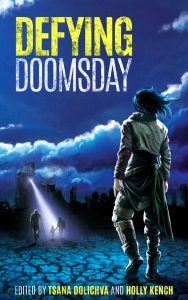Not if You Were the Last Short Story on Earth: May 2016 DOOM EDITION
 It’s all apocalypse and global warming and terrifying futures in my reading this month!
It’s all apocalypse and global warming and terrifying futures in my reading this month!
First, an extraordinary presentation/monologue presented as a Ted Talk: A Sci-Fi Vision of Love from a 318 year old hologram, by Monica Byrne, a gorgeous and deeply emotional performance that works as a clever, layered piece of science fiction as well as being an affecting love story.
Jonathan Strahan’s new anthology Drowned Worlds explores the many horrific possibilities of those pesky rising oceans, that I normally prefer to think about as little as possible. Thanks for the nightmares, Jonathan!
The opening story of this book, “Elves of Antarctica” by Paul McCauley is a great character piece that sets the tone very well, with a protagonist who rails against the loss of the icecaps in Antarctica, and can’t see beyond that tragedy to the intriguing new possibilities of grass, warmth and oh yes, FREAKING MAMMOTHS. Also, there are elves, or are there? Yes, I think there are. Those standing stones have to mean something, right? A gorgeous, thought-provoking piece.
Scrolling all the way to the end of the book (because yes I have a Kindle and I am shameless in reading anthologies in whatever order I like), the final piece is “The Future is Blue” by Catherynne M Valente – a fun, nihilistic piece of futurepunk which utilises excessive use of the word ‘Fuckwit’ (this only goes to show that she should count as an honorary Australian). The Fuckwits, by the way, are us, the generation/s who allowed the world to get in terrible state that is, honestly, not that far off. This story is furious, filthy and angry, and I love it.
Defying Doomsday, edited by Tsana Dolichva and Holly Kench, is a book I’ve been hanging out to read since the crowdfunding campaign last year! I hadn’t read it yet even though I’ve had a copy for a while thanks to being one of the authors. The premise of the book, which is challenging the idea of “survival of the fittest” by featuring apocalyptic stories with disabled protagonist, is expressed with furious, dynamic energy in the introduction (by the amazing Robert Hoge) as well as its opening story, “And the Rest of Us Wait,” by Corinne Duyvis.
The story is a rich character piece told through the eyes a young woman with spina bifida and other chronic health issues, who also happens to be a pop star in her own country in a time when the Earth is being evacuated in the face of disaster. The story is funny, sweet and utterly savage (and rightfully so) in its depiction of how the able-bodied are so often willing to drop the facade of tolerating/helping the disabled in times of crisis. But there’s so much more to this one, including the need for distraction and entertainment (hey girls, let’s form a band right here in the temporary shelter and put on a show!) when facing the worst case scenario, and the way that young women (with and without disability) and their actions are often perceived as shallow and selfish by their elders, regardless of their actual motives. If the whole book is full of stories like this then I am really excited to read the rest of it.
The second story in the collection, Stephanie Gunn’s “To Take Into The Air My Quiet Breath” is beautiful and somewhat harrowing, a story of healthcare and hope and cystic fibrosis, with three sisters struggling to cope alone on their farm in the wake of a pandemic.
Chances are very high that next month’s LSS will be featuring a lot more from Drowned Worlds and Defying Doomsday – these are great books to read side by side! I’m going to have to find some less doomy works to read in between the stories, though, as there’s only so much realistic apocalypse I can deal with before I start hyperventilating and clutching my children to me.
To be continued!



